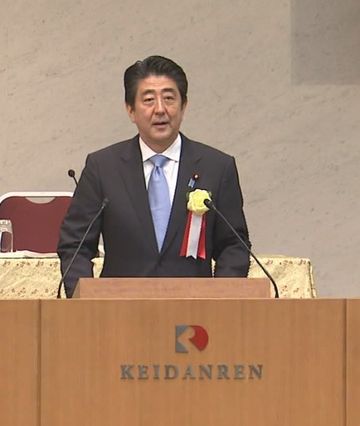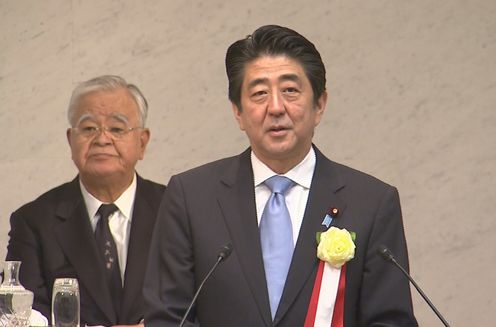Home > News > The Prime Minister in Action > June 2014 > Regular General Meeting of the Nippon Keidanren (Japan Business Federation)
Regular General Meeting of the Nippon Keidanren (Japan Business Federation)
Tuesday, June 3, 2014

Photograph of the Prime Minister delivering an address (1)

Photograph of the Prime Minister delivering an address (2)
Prime Minister Shinzo Abe attended the Regular General Meeting of the Nippon Keidanren held in Tokyo.
The Prime Minister said in his address,
“We will continue to exert every effort for economic revitalization. It has now been five months since I made that promise to all of you at the Council meeting held at the end of last year. The Japanese economy continues to be reborn, driven by the three arrows of Abenomics.
After this meeting, I will head to the G7 summit meeting, where the world is eyeing the reform and revival of Japan.
Within the announcements of financial results this spring, 70% of Japan’s publically listed companies announced an increase in income and increase in profit. This spring, many people here today made the decision to raise wages. According to the latest survey results, the proportion of large enterprises that raised base wages grew from approximately 8% last fiscal year to approximately 47% this fiscal year. Over 70% of those enterprises were implementing their first raise in base salaries in six years or more.
The Japanese economy is truly being reborn. Even capital investments, which had stagnated, are starting to see full-fledged, positive movement. We must connect this trend to a sustainable virtuous cycle, and enhance the earning ability of the entire nation.
Bold and positive investment into technology and people by everyone in the private sector, along with a commitment to reform, are key to achieving this. I, too, will fully support the positive initiatives of the private sector, and exert every effort so that throughout the country, everyone experiences the warm winds of economic recovery firsthand. I do not fear reform. I am committed to reform, and I will steadily carry it out.
In April, we raised the consumption tax rate for the first time in 17 years. We will simultaneously achieve economic revitalization, fiscal soundness, and social security reform. We will reform the regional monopolies in electric power that have lasted for 60 years, and we will turn them into completely competitive markets. Indeed, right now, at this very moment, deliberations are underway on relevant legislation in the Diet. We have also decided to abolish the production adjustment system for rice that has been in place for over 40 years, the so-called ‘gentan’ system.
This month, we shall announce a concrete program to further enhance the third arrow of Abenomics. Given the constraints on the number of workers, the success or failure of our Growth Strategy will hinge upon whether we can achieve highly productive ways of working. We will create new options related to the system for working hours, so that workers have the flexibility to choose a work style that is best suited to their own situation, thereby allowing them to make the most of their talents.
In order to make agriculture into a new growth industry, we must create an environment that will allow a continuous stream of new, business-minded farmers to participate and succeed. For this purpose, three sets of reforms will be pursued collectively for the reconsideration of agricultural commissions, the review of the requirements for corporations' ownership of farmlands, and the fundamental review of agricultural cooperatives.
From April, the effective corporate tax rate was lowered 2.4 percent. We will undertake further reform of the corporate tax rate. We will realign the structure of the corporate tax rate to one that is oriented to growth, such that Japan can emerge as a winner against competition within the global economy. We will decide on a major direction for reform by the end of this month.
We will also make progress on the enhancement of corporate governance. The announcement that a stewardship code has been accepted by the Government Pension Investment Fund (GPIF), which is undertaking forward-looking reform, will surely be a major force for this. In order to further accelerate this trend, we will make the creation of a corporate governance code a part of the Growth Strategy. We will attract human capital and technology from around the world, and tap into global growth. This, too, shall be an important pillar of the Growth Strategy.
The TPP will establish a single economic zone in the Asia-Pacific region and create new rules among countries that share the same universal values. It is truly a provident masterstroke. During a summit meeting some time ago with President Obama, we were able to identify a path forward on important bilateral issues. This marked an important achievement and a key milestone in TPP negotiations.
We are leveraging this momentum and the leadership of both Japan and the United States for all-out efforts toward the early conclusion of negotiations. This April, together with Prime Minister Abbott of Australia, we were able to achieve a general agreement on the Japan-Australia Economic Partnership Agreement (EPA). At the time of my visit to Europe as well, I called for the establishment of a Japan-European Union (EU) EPA by the end of next year. I am determined to do whatever it takes to realize this.
The Abe Administration is positioning women’s active role not as a social policy, but as a core principle of the Growth Strategy. The Government aims to realize a society in which women occupy more than 30% of leadership positions by 2020. It is pleasing to see a recent increase in the number of companies that are promoting women’s active role, including by appointing female members to their executive teams. I would like for you to further accelerate this trend. The Government will make every effort to create a society in which women shine.
I have heard that at the meeting after this today, Chairman Yonekura is scheduled to step down, and the new Chair, Sakakibara, will be appointed. Chair Yonekura exercised skill in taking the helm for the business community during a difficult period. I thank him for this from the bottom of my heart. I hope that the public and private sectors will continue to come together as one under the leadership of the new Chairman Sakakibara for further reform and the realization of growth.
I would like to conclude my remarks by promising to everyone that we will continue to work with you and exert every effort for realizing economic revitalization and a virtuous cycle of the economy.”

